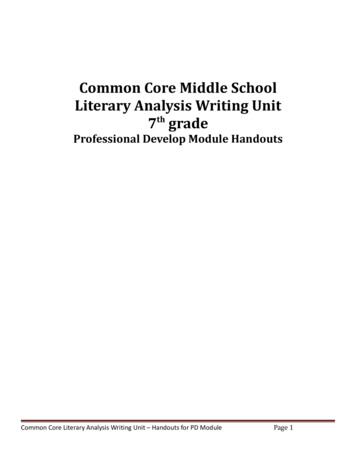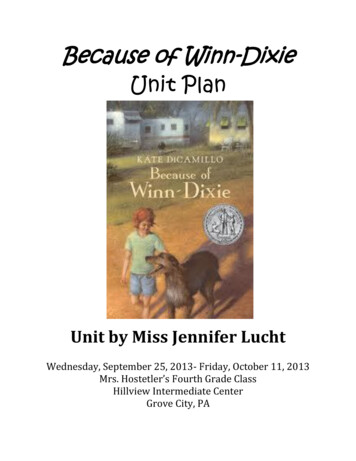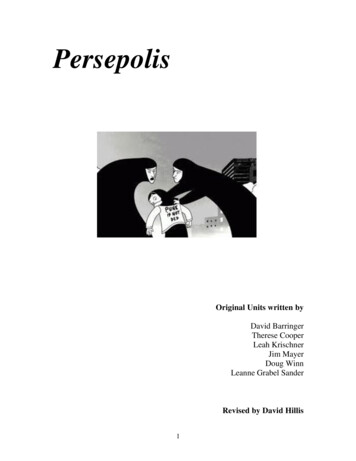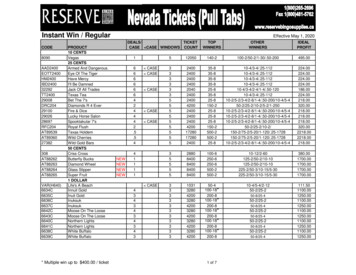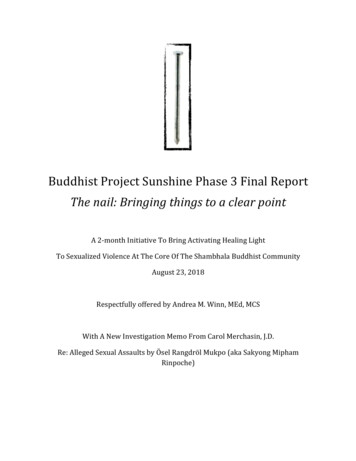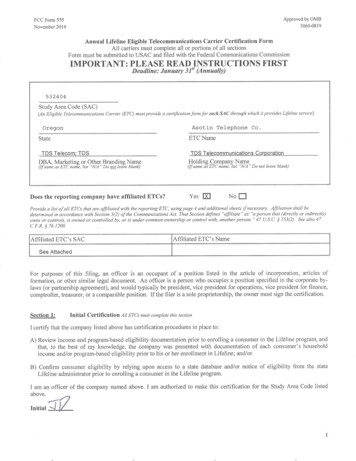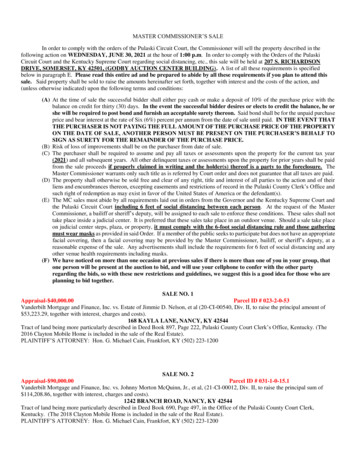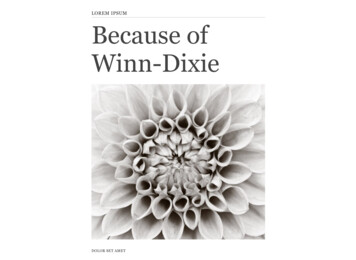
Transcription
LOREM IPSUMBecause ofWinn-DixieDOLOR SET AMET
2
Also by Kate DiCamillo:The Magician’s ElephantThe Miraculous Journey of Edward TulaneThe Tale of DespereauxThe Tiger RisingMercy Watson to the RescueMercy Watson Goes for a RideMercy Watson Fights CrimeMercy Watson: Princess in DisguiseMercy Watson Thinks Like a PigMercy Watson:Something Wonky This Way ComesGreat JoyThe author owes a joyful debt to Betty DiCamillo, Linda Nelson, Amy Ehrlich,Jane Resh Thomas, Liz Bicknell, the Wednesday night group, the Mondaynight group, and to Kara LaReau, founding member of the Because of WinnDixie Fan Club and editor extraordinaire.This is a work of fiction. Names, characters, places, and incidents are eitherproducts of the author’s imagination or, if real, are used fictitiously.Copyright 2000 by Kate DiCamilloCover illustration copyright 2000 by Chris ShebanAll rights reserved. No part of this book may be reproduced, transmitted, orstored in an information retrieval system in any form or by any means,graphic, electronic, or mechanical, including photocopying, taping, andrecording, without prior written permission from the publisher.Winn-Dixie is a Federally Registered trademark and service mark ownedby The Winn-Dixie Stores, Inc. This work has not been prepared,manufactured, approved, or licensed by The Winn-Dixie Stores, Inc. Neitherthe author of this work nor its publishers are in any way affiliated with TheWinn-Dixie Stores, Inc.First electronic edition 2009The Library of Congress has cataloged the hardcover edition as follows:DiCamillo, Kate.Because of Winn-Dixie / Kate DiCamillo. — 1st ed.p. cm.Summary: Ten-year-old India Opal Buloni describes her first summer in thetown of Naomi, Florida, and all the good things that happen to her becauseof her big ugly dog Winn-Dixie.ISBN 978-0-7636-0776-0 (hardcover)[1. Dogs — Fiction. 2. City and town life — Florida — Fiction. 3. Florida —Fiction.] I. Title.PZ7.D5455Be 2000[Fic] — dc21 99-34260ISBN 978-0-7636-1605-2 (paperback)ISBN 978-0-7636-4432-1 (reformatted paperback)ISBN 978-0-7636-4945-6 (electronic)Candlewick Press99 Dover StreetSomerville, Massachusetts 02144visit us at www.candlewick.com3
My name is India Opal Buloni, and last summer mydaddy, the preacher, sent me to the store for a box ofmacaroni-and-cheese, some white rice, and twotomatoes and I came back with a dog. This is whathappened: I walked into the produce section of the WinnDixie grocery store to pick out my two tomatoes and Ialmost bumped right into the store manager. He wasstanding there all red-faced, screaming and waving hisarms around.“Who let a dog in here?” he kept on shouting. “Wholet a dirty dog in here?”At first, I didn’t see a dog. There were just a lot ofvegetables rolling around on the floor, tomatoes andonions and green peppers. And there was what seemedlike a whole army of Winn-Dixie employees runningaround waving their arms just the same way the storemanager was waving his.And then the dog came running around the corner.He was a big dog. And ugly. And he looked like he washaving a real good time. His tongue was hanging out andhe was wagging his tail. He skidded to a stop and smiledright at me. I had never before in my life seen a dogsmile, but that is what he did. He pulled back his lips andshowed me all his teeth. Then he wagged his tail so hardthat he knocked some oranges off a display, and theywent rolling everywhere, mixing in with the tomatoes andonions and green peppers.The manager screamed, “Somebody grab that dog!”4
The dog went running over to the manager, wagginghis tail and smiling. He stood up on his hind legs. Youcould tell that all he wanted to do was get face to facewith the manager and thank him for the good time he washaving in the produce department, but somehow heended up knocking the manager over. And the managermust have been having a bad day, because lying thereon the floor, right in front of everybody, he started to cry.The dog leaned over him, real concerned, and licked hisface.“Please,” said the manager. “Somebody call thepound.”“Wait a minute!” I hollered. “That’s my dog. Don’t callthe pound.”All the Winn-Dixie employees turned around andlooked at me, and I knew I had done something big. Andmaybe stupid, too. But I couldn’t help it. I couldn’t let thatdog go to the pound.“Here, boy,” I said.The dog stopped licking the manager’s face and puthis ears up in the air and looked at me, like he was tryingto remember where he knew me from.“Here, boy,” I said again. And then I figured that thedog was probably just like everybody else in the world,that he would want to get called by a name, only I didn’tknow what his name was, so I just said the first thing thatcame into my head. I said, “Here, Winn-Dixie.”And that dog came trotting over to me just like hehad been doing it his whole life.The manager sat up and gave me a hard stare, likemaybe I was making fun of him.“It’s his name,” I said. “Honest.”The manager said, “Don’t you know not to bring adog into a grocery store?”“Yes sir,” I told him. “He got in by mistake. I’m sorry.It won’t happen again.“Come on, Winn-Dixie,” I said to the dog.I started walking and he followed along behind meas I went out of the produce department and down thecereal aisle and past all the cashiers and out the door.Once we were safe outside, I checked him over realcareful and he didn’t look that good. He was big, butskinny; you could see his ribs. And there were baldpatches all over him, places where he didn’t have any furat all. Mostly, he looked like a big piece of old browncarpet that had been left out in the rain.“You’re a mess,” I told him. “I bet you don’t belong toanybody.”He smiled at me. He did that thing again, where hepulled back his lips and showed me his teeth. He smiledso big that it made him sneeze. It was like he was saying,“I know I’m a mess. Isn’t it funny?”It’s hard not to immediately fall in love with a dogwho has a good sense of humor.“Come on,” I told him. “Let’s see what the preacherhas to say about you.”And the two of us, me and Winn-Dixie, startedwalking home.5
Thatsummer I found Winn-Dixie was also thesummer me and the preacher moved to Naomi, Florida,so he could be the new preacher at the Open ArmsBaptist Church of Naomi. My daddy is a good preacherand a nice man, but sometimes it’s hard for me to thinkabout him as my daddy, because he spends so muchtime preaching or thinking about preaching or gettingready to preach. And so, in my mind, I think of him as“the preacher.” Before I was born, he was a missionary inIndia and that is how I got my first name. But he calls meby my second name, Opal, because that was hismother’s name. And he loved her a lot.Anyway, while me and Winn-Dixie walked home, Itold him how I got my name and I told him how I had justmoved to Naomi. I also told him about the preacher andhow he was a good man, even if he was too distractedwith sermons and prayers and suffering people to gogrocery shopping.“But you know what?” I told Winn-Dixie. “You are asuffering dog, so maybe he will take to you right away.Maybe he’ll let me keep you.”Winn-Dixie looked up at me and wagged his tail. Hewas kind of limping like something was wrong with one ofhis legs. And I have to admit, he stunk. Bad. He was anugly dog, but already, I loved him with all my heart.When we got to the Friendly Corners Trailer Park, Itold Winn-Dixie that he had to behave right and be quiet,because this was an all adult trailer park and the onlyreason I got to live in it was because the preacher was apreacher and I was a good, quiet kid. I was what theFriendly Corners Trailer Park manager, Mr. Alfred, called“an exception.” And I told Winn-Dixie he had to act like anexception, too; specifically, I told him not to pick anyfights with Mr. Alfred’s cats or Mrs. Detweller’s littleyappie Yorkie dog, Samuel. Winn-Dixie looked up at mewhile I was telling him everything, and I swear heunderstood.“Sit,” I told him when we got to my trailer. He sat rightdown. He had good manners. “Stay here,” I told him. “I’llbe right back.”The preacher was sitting in the living room, workingat the little foldout table. He had papers spread all aroundhim and he was rubbing his nose, which always meanshe is thinking. Hard.“Daddy?” I said.“Hmmm,” he said back.“Daddy, do you know how you always tell me that weshould help those less fortunate than ourselves?”“Mmmmmm-hmmm,” he said. He rubbed his noseand looked around at his papers.“Well,” I said, “I found a Less Fortunate at thegrocery store.”“Is that right?” he said.“Yes sir,” I told him. I stared at the preacher reallyhard. Sometimes he reminded me of a turtle hiding insideits shell, in there thinking about things and not eversticking his head out into the world. “Daddy, I waswondering. Could this Less Fortunate, could he stay withus for a while?”Finally the preacher looked up at me. “Opal,” hesaid, “what are you talking about?”“I found a dog,” I told him. “And I want to keep him.”6
“No dogs,” the preacher said. “We’ve talked aboutthis before. You don’t need a dog.”“I know it,” I said. “I know I don’t need a dog. But thisdog needs me. Look,” I said. I went to the trailer door andI hollered, “Winn-Dixie!”Winn-Dixie’s ears shot up in the air and he grinnedand sneezed, and then he came limping up the steps andinto the trailer and put his head right in the preacher’slap, right on top of a pile of papers.The preacher looked at Winn-Dixie. He looked at hisribs and his matted-up fur and the places where he wasbald. The preacher’s nose wrinkled up. Like I said, thedog smelled pretty bad.Winn-Dixie looked up at the preacher. He pulledback his lips and showed the preacher all of his crookedyellow teeth and wagged his tail and knocked some ofthe preacher’s papers off the table. Then he sneezed andsome more papers fluttered to the floor.“What did you call this dog?” the preacher asked.“Winn-Dixie,” I whispered. I was afraid to sayanything too loud. I could see that Winn-Dixie was havinga good effect on the preacher. He was making him pokehis head out of his shell.“Well,” said the preacher. “He’s a stray if I’ve everseen one.” He put down his pencil and scratched WinnDixie behind the ears. “And a Less Fortunate, too. That’sfor sure. Are you looking for a home?” the preacherasked, real soft, to Winn-Dixie.Winn-Dixie wagged his tail.“Well,” the preacher said. “I guess you’ve found one.”I started in on Winn-Dixie right away, trying to cleanhim up. First, I gave him a bath. I used the garden hoseand some baby shampoo. He stood still for it, but I couldtell he didn’t like it. He looked insulted, and the wholetime, he didn’t show me his teeth or wag his tail once.After he was all washed and dried, I brushed him good. Iused my own hairbrush and worked real hard at all theknots and patches of fur stuck together. He didn’t mindbeing brushed. He wiggled his back, like it felt prettygood.The whole time I was working on him, I was talkingto him. And he listened. I told him how we were alike.“See,” I said, “you don’t have any family and neither do I.I’ve got the preacher, of course. But I don’t have a mama.I mean I have one, but I don’t know where she is. She leftwhen I was three years old. I can’t hardly remember her.And I bet you don’t remember your mama much either.So we’re almost like orphans.”Winn-Dixie looked straight at me when I said that tohim, like he was feeling relieved to finally have somebodyunderstand his situation. I nodded my head at him andwent on talking.“I don’t even have any friends, because I had toleave them all behind when we moved here from Watley.Watley’s up in north Florida. Have you ever been to northFlorida?”Winn-Dixie looked down at the ground, like he wastrying to remember if he had.7
“You know what?” I said. “Ever since we movedhere, I’ve been thinking about my mama extra-extra hard,more than I ever did when I was in Watley.”Winn-Dixie twitched his ears and raised hiseyebrows.“I think the preacher thinks about my mama all thetime, too. He’s still in love with her; I know that because Iheard the ladies at the church in Watley talking abouthim. They said he’s still hoping she’ll come back. But hedoesn’t tell me that. He won’t talk to me about her at all. Iwant to know more about her. But I’m afraid to ask thepreacher; I’m afraid he’ll get mad at me.”Winn-Dixie looked at me hard, like he was trying tosay something.“What?” I said.He stared at me.“You think I should make the preacher tell me abouther?”Winn-Dixie looked at me so hard he sneezed.“I’ll think about it,” I said.When I was done working on him, Winn-Dixie lookeda whole lot better. He still had his bald spots, but the furthat he did have cleaned up nice. It was all shiny andsoft. You could still see his ribs, but I intended to feed himgood and that would take care of that. I couldn’t doanything about his crooked yellow teeth because he gotinto a sneezing fit every time I started brushing them withmy toothbrush, and I finally had to give up. But for themost part, he looked a whole lot better, and so I took himinto the trailer and showed him to the preacher.“Daddy,” I said.“Hmmm,” he said. He was working on a sermon andkind of muttering to himself.“Daddy, I wanted to show you the new Winn-Dixie.”The preacher put down his pencil and rubbed hisnose, and finally, he looked up.“Well,” he said, smiling real big at Winn-Dixie, “well,now. Don’t you look handsome.”Winn-Dixie smiled back at the preacher. He wentover and put his head in the preacher’s lap.“He smells nice, too,” said the preacher. He rubbedWinn-Dixie’s head and looked into his eyes.“Daddy,” I said, real quick before I lost all my nerve,“I’ve been talking to Winn-Dixie.”“Is that right?” the preacher said; he scratched WinnDixie’s head.“I’ve been talking to him and he agreed with me that,since I’m ten years old, you should tell me ten thingsabout my mama. Just ten things, that’s all.”The preacher stopped rubbing Winn-Dixie’s headand held real still. I could see him thinking about pullinghis head back into his shell.“One thing for each year I’ve been alive,” I told him.“Please.”Winn-Dixie looked up at the preacher and kind ofgave him a nudge with his nose.The preacher sighed. He said to Winn-Dixie, “Ishould have guessed you were going to be trouble.” Thenhe looked at me. “Come on, Opal,” he said. “Sit down.And I will tell you ten things about your mama.”8
One,”said the preacher. We were sitting on thecouch and Winn-Dixie was sitting between us. Winn-Dixiehad already decided that he liked the couch a lot. “One,”said the preacher again. Winn-Dixie looked at him kind ofhard. “Your mama was funny. She could make just aboutanybody laugh.”“Two,” he said. “She had red hair and freckles.”“Just like me,” I said.“Just like you,” the preacher nodded.“Three. She liked to plant things. She had a talent forit. She could stick a tire in the ground and grow a car.”Winn-Dixie started chewing on his paw, and I tappedhim on the head to make him stop.“Four,” said the preacher. “She could run fast. If youwere racing her, you couldn’t ever let her get a headstart, because she would beat you for sure.”“I’m that way, too,” I said. “Back home, in Watley, Iraced Liam Fullerton, and beat him, and he said it wasn’tfair, because boys and girls shouldn’t race each other tobegin with. I told him he was just a sore loser.”The preacher nodded. He was quiet for a minute.“I’m ready for number five,” I told him.“Five,” he said. “She couldn’t cook. She burnedeverything, including water. She had a hard time openinga can of beans. She couldn’t make head nor tail of apiece of meat. Six.” The preacher rubbed his nose andlooked up at the ceiling. Winn-Dixie looked up, too.“Number six is that your mama loved a story. She wouldsit and listen to stories all day long. She loved to be told astory. She especially liked funny ones, stories that madeher laugh.” The preacher nodded his head like he wasagreeing with himself.“What’s number seven?” I asked.“Let’s see,” he said. “She knew all the constellations,every planet in the nighttime sky. Every last one of them.She could name them. And point them out. And shenever got tired of looking up at them.“Number eight,” said the preacher, with his eyesclosed, “was that she hated being a preacher’s wife. Shesaid she just couldn’t stand having the ladies at churchjudge what she was wearing and what she was cookingand how she was singing. She said it made her feel like abug under a microscope.”Winn-Dixie lay down on the couch. He put his nosein the preacher’s lap and his tail in mine.“Ten,” said the preacher.“Nine,” I told him.“Nine,” said the preacher. “She drank. She drankbeer. And whiskey. And wine. Sometimes, she couldn’tstop drinking. And that made me and your mama fightquite a bit. Number ten,” he said with a long sigh,“number ten, is that your mama loved you. She loved youvery much.”“But she left me,” I told him.“She left us,” said the preacher softly. I could see himpulling his old turtle head back into his stupid turtle shell.“She packed her bags and left us, and she didn’t leaveone thing behind.”“Okay,” I said. I got up off the couch. Winn-Dixiehopped off, too. “Thank you for telling me,” I said.I went right back to my room and wrote down all tenthings that the preacher had told me. I wrote them downjust the way he said them to me so that I wouldn’t forget9
them, and then I read them out loud to Winn-Dixie until Ihad them memorized. I wanted to know those ten thingsinside and out. That way, if my mama ever came back, Icould recognize her, and I would be able to grab her andhold on to her tight and not let her get away from meagain.Winn-Dixie couldn’t stand to be left alone; we foundthat out real quick. If me and the preacher went off andleft him by himself in the trailer, he pulled all the cushionsoff the couch and all the toilet paper off the roll. So westarted tying him up outside with a rope when we left.That didn’t work either. Winn-Dixie howled until Samuel,Mrs. Detweller’s dog, started howling, too. It was exactlythe kind of noise that people in an all adult trailer park donot like to hear.“He just doesn’t want to be left alone,” I told thepreacher. “That’s all. Let’s take him with us.” I couldunderstand the way Winn-Dixie felt. Getting left behindprobably made his heart feel empty.After a while, the preacher gave in. And everywherewe went, we took Winn-Dixie. Even to church.The Open Arms Baptist Church of Naomi isn’t aregular-looking church. The building used to be a Pick-ItQuick store, and when you walk in the front door, the firstthing you see is the Pick-It-Quick motto. It’s written on thefloor in little tiny red tiles that make great big letters thatsay “PICK PICK PICK QUICK QUICK QUICK.” Thepreacher tried painting over those tiles, but the letterswon’t stay covered up, and so the preacher has justgiven up and let them be.The other thing about the Open Arms that is differentfrom other churches is there aren’t any pews. Peoplebring in their own foldup chairs and lawn chairs, and sosometimes it looks more like the congregation iswatching a parade or sitting at a barbecue instead of10
being at church. It’s kind of a strange church and Ithought Winn-Dixie would fit right in.But the first time we brought Winn-Dixie to the OpenArms, the preacher tied him outside the front door.“Why did we bring him all the way here just to tie himup?” I asked the preacher.“Because dogs don’t belong in church, Opal,” thepreacher said. “That’s why.”He tied Winn-Dixie up to a tree and said how therewas lots of shade for him and that it ought to work outreal good.Well, it didn’t. The service started and there wassome singing and some sharing and some praying, andthen the preacher started preaching. And he wasn’t buttwo or three words into his sermon when there was aterrible howl coming from outside.The preacher tried to ignore it.“Today,” he said.“Aaaaaarrooo,” said Winn-Dixie.“Please,” said the preacher.“Arrrroooowwww,” said Winn-Dixie back.“Friends,” said the preacher.“Arrruiiiiipppp,” wailed Winn-Dixie.Everyone turned in their lawn chairs and foldupchairs and looked at one another.“Opal,” said the preacher.“Owwwwww,” said Winn-Dixie.“Yes sir?” I said.“Go get that dog!” he yelled.“Yes sir!” I yelled back.I went outside and untied Winn-Dixie and broughthim inside, and he sat down beside me and smiled up atthe preacher, and the preacher couldn’t help it; he smiledback. Winn-Dixie had that effect on him.And so the preacher started in preaching again.Winn-Dixie sat there listening to it, wiggling his ears thisway and that, trying to catch all the words. Andeverything would have been all right, except that amouse ran across the floor.The Open Arms had mice. They were there fromwhen it was a Pick-It-Quick and there were lots of goodthings to eat in the building, and when the Pick-It-Quickbecame the Open Arms Baptist Church of Naomi, themice stayed around to eat all the leftover crumbs fromthe potluck suppers. The preacher kept on saying he wasgoing to have to do something about them, but he neverdid. Because the truth is, he couldn’t stand the thought ofhurting anything, even a mouse.Well, Winn-Dixie saw that mouse, and he was upand after him. One minute, everything was quiet andserious and the preacher was going on and on and on;and the next minute, Winn-Dixie looked like a furry bullet,shooting across the building, chasing that mouse. Hewas barking and his feet were skidding all over thepolished Pick-It-Quick floor, and people were clappingand hollering and pointing. They really went wild whenWinn-Dixie actually caught the mouse.“I have never in my life seen a dog catch a mouse,”said Mrs. Nordley. She was sitting next to me.“He’s a special dog,” I told her.“I imagine so,” she said back.Winn-Dixie stood up there in front of the wholechurch, wagging his tail and holding the mouse realcareful in his mouth, holding onto him tight but notsquishing him.11
“I believe that mutt has got some retriever in him,”said somebody behind me. “That’s a hunting dog.”Winn-Dixie took the mouse over to the preacher anddropped it at his feet. And when the mouse tried to getaway, Winn-Dixie put his paw right on the mouse’s tail.Then he smiled up at the preacher. He showed him all histeeth. The preacher looked down at the mouse. Helooked at Winn-Dixie. He looked at me. He rubbed hisnose. It got real quiet in the Pick-It-Quick.“Let us pray,” the preacher finally said, “for thismouse.”And everybody started laughing and clapping. Thepreacher picked up the mouse by the tail and walked andthrew it out the front door of the Pick-It-Quick, andeverybody applauded again.Then he came back and we all prayed together. Iprayed for my mama. I told God how much she wouldhave enjoyed hearing the story of Winn-Dixie catchingthat mouse. It would have made her laugh. I asked God ifmaybe I could be the one to tell her that story someday.And then I talked to God about how I was lonely inNaomi because I didn’t know that many kids, only theones from church. And there weren’t that many kids atthe Open Arms, just Dunlap and Stevie Dewberry, twobrothers who weren’t twins but looked like they were. AndAmanda Wilkinson, whose face was always pinched uplike she was smelling something real bad; and SweetiePie Thomas, who was only five years old and still mostlya baby. And none of them wanted to be my friend anywaybecause they probably thought I’d tell on them to thepreacher for every little thing they did wrong; and thenthey would get in trouble with God and their parents. So Itold God that I was lonely, even having Winn-Dixie.And finally, I prayed for the mouse, like the preachersuggested. I prayed that he didn’t get hurt when he wentflying out the door of the Open Arms Baptist Church ofNaomi. I prayed that he landed on a nice soft patch ofgrass.12
I spent a lot of time that summer at the Herman W.Block Memorial Library. The Herman W. Block MemorialLibrary sounds like it would be a big fancy place, but it’snot. It’s just a little old house full of books, and MissFranny Block is in charge of them all. She is a very small,very old woman with short gray hair, and she was the firstfriend I made in Naomi.It all started with Winn-Dixie not liking it when I wentinto the library, because he couldn’t go inside, too. But Ishowed him how he could stand up on his hind legs andlook in the window and see me in there, selecting mybooks; and he was okay, as long as he could see me. Butthe thing was, the first time Miss Franny Block saw WinnDixie standing up on his hind legs like that, looking in thewindow, she didn’t think he was a dog. She thought hewas a bear.This is what happened: I was picking out my booksand kind of humming to myself, and all of a sudden, therewas this loud and scary scream. I went running up to thefront of the library, and there was Miss Franny Block,sitting on the floor behind her desk.“Miss Franny?” I said. “Are you all right?”“A bear,” she said.“A bear?” I asked.“He has come back,” she said.“He has?” I asked. “Where is he?”“Out there,” she said and raised a finger and pointedat Winn-Dixie standing up on his hind legs, looking in thewindow for me.“Miss Franny Block,” I said, “that’s not a bear. That’sa dog. That’s my dog. Winn-Dixie.”“Are you positive?” she asked.“Yes ma’am,” I told her. “I’m positive. He’s my dog. Iwould know him anywhere.”Miss Franny sat there trembling and shaking.“Come on,” I said. “Let me help you up. It’s okay.” Istuck out my hand and Miss Franny took hold of it, and Ipulled her up off the floor. She didn’t weigh hardlyanything at all. Once she was standing on her feet, shestarted acting all embarrassed, saying how I must thinkshe was a silly old lady, mistaking a dog for a bear, butthat she had a bad experience with a bear coming intothe Herman W. Block Memorial Library a long time agoand she never had quite gotten over it.“When did that happen?” I asked her.“Well,” said Miss Franny, “it is a very long story.”“That’s okay,” I told her. “I am like my mama in that Ilike to be told stories. But before you start telling it, canWinn-Dixie come in and listen, too? He gets lonelywithout me.”“Well, I don’t know,” said Miss Franny. “Dogs are notallowed in the Herman W. Block Memorial Library.”“He’ll be good,” I told her. “He’s a dog who goes tochurch.” And before she could say yes or no, I wentoutside and got Winn-Dixie, and he came in and laydown with a “huummmppff” and a sigh, right at MissFranny’s feet.She looked down at him and said, “He most certainlyis a large dog.”“Yes ma’am,” I told her. “He has a large heart, too.”“Well,” Miss Franny said. She bent over and gaveWinn-Dixie a pat on the head, and Winn-Dixie waggedhis tail back and forth and snuffled his nose on her little13
old-lady feet. “Let me get a chair and sit down so I cantell this story properly.”Backwhen Florida was wild, when it consisted ofnothing but palmetto trees and mosquitoes so big theycould fly away with you,” Miss Franny Block started in,“and I was just a little girl no bigger than you, my father,Herman W. Block, told me that I could have anything Iwanted for my birthday. Anything at all.”Miss Franny looked around the library. She leaned inclose to me. “I don’t want to appear prideful,” she said,“but my daddy was a very rich man. A very rich man.”She nodded and then leaned back and said, “And I was alittle girl who loved to read. So I told him, I said, ‘Daddy, Iwould most certainly love to have a library for mybirthday, a small little library would be wonderful.’”“You asked for a whole library?”“A small one,” Miss Franny nodded. “I wanted a littlehouse full of nothing but books and I wanted to sharethem, too. And I got my wish. My father built me thishouse, the very one we are sitting in now. And at a veryyoung age, I became a librarian. Yes ma’am.”“What about the bear?” I said.“Did I mention that Florida was wild in those days?”Miss Franny Block said.“Uh-huh, you did.”“It was wild. There were wild men and wild womenand wild animals.”“Like bears!”“Yes ma’am. That’s right. Now, I have to tell you, Iwas a little-miss-know-it-all. I was a miss-smarty-pantswith my library full of books. Oh, yes ma’am, I thought I14
knew the answers to everything. Well, one hot Thursday,I was sitting in my library with all the doors and windowsopen and my nose stuck in a book, when a shadowcrossed the desk. And without looking up, yes ma’am,without even looking up, I said, ‘Is there a book I can helpyou find?’“Well, there was no answer. And I thought it mighthave been a wild man or a wild woman, scared of allthese books and afraid to speak up. But then I becameaware of a very peculiar smell, a very strong smell. Iraised my eyes slowly. And standing right in front of mewas a bear. Yes ma’am. A very large bear.”“How big?” I asked.“Oh, well,” said Miss Franny, “perhaps three timesthe size of your dog.”“Then what happened?” I asked her.“Well,” said Miss Franny, “I looked at him and helooked at me. He put his big nose up in the air and sniffedand sniffed as if he was trying to decide if a little-missknow-it-all librarian was what he was in the mood to eat.And I sat there. And then I thought, ‘Well, if this bearintends to eat me, I am not going to let it happen withouta fight. No ma’am.’ So very slowly and very carefully, Iraised up the book I was reading.”“What book was that?” I asked.“Why, it was War and Peace, a very large book. Iraised it up slowly and then I aimed it carefully and Ithrew it right at that bear and screamed, ‘Be gone!’ Anddo you know what?”“No ma’am,” I said.“He went. But this is what I will never forget. He tookthe book with him.”“Nuh-uh,” I said.“Yes ma’am,” said Miss Franny. “He snatched it upand ran.”“Did he come back?” I asked.“No, I never saw him again. Well, the men in townused to tease me about it. They used to say, ‘MissFranny, we saw that bear of yours out in the woods today.He was reading that book and he said it sure was goodand would it be all right if he kept it for just another week.’Yes ma’am. They did tease me about
ended up knocking the manager over. And the manager must have been having a bad day, because lying there on the floor, right in front of everybody, he started to cry. The dog leaned over him, real concerned, and licked his face. “Please,” said the manager. “Somebody call the pound.” “Wai
